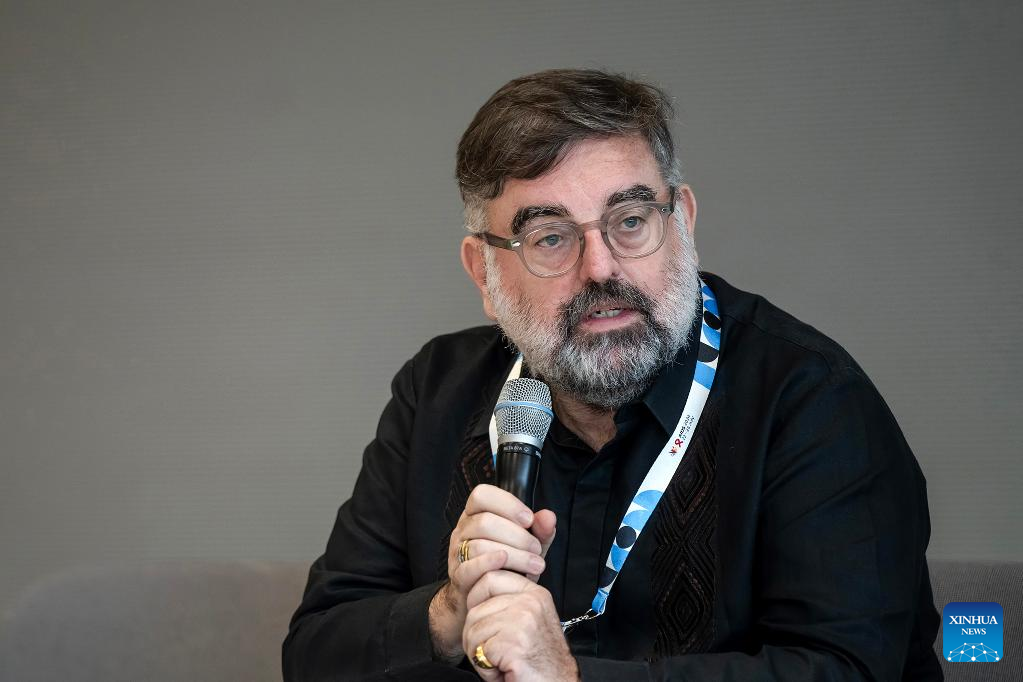
Eamonn Murphy, UNAIDS regional director for Asia-Pacific, Eastern Europe, and Central Asia, speaks during the 25th International AIDS Conference.(Xinhua)
BERLIN, July 25 (Xinhua) -- Eamonn Murphy, UNAIDS regional director for Asia-Pacific, Eastern Europe, and Central Asia, underscored the critical juncture in the global fight against AIDS in an exclusive interview with Xinhua during the 25th International AIDS Conference.
"Some countries are on the right path and could achieve the elimination of HIV as a public health threat, but others are experiencing rising infections," Murphy said. He highlighted the progress in treatment coverage, noting, "We've seen success with 77 percent of people on treatment today, compared to 47 percent in 2010."
Despite these advances, Murphy expressed concerns over troubling trends in Latin America, Eastern Europe, and Central Asia, where infections are rising. He cited a 20-percent regional increase in new infections in Eastern Europe and Central Asia between 2010 and 2023, with 50 percent of those needing treatment still not receiving it. "We're alarmed and at a crossroads," he said.
Murphy attributed these setbacks to a decline in both domestic and international resources for AIDS prevention and treatment. "This is not only reflected in the shrinking of domestic resources; even international resources are no longer available for prevention in many of these areas," he explained, and called on governments to ensure access to all prevention and treatment services and to help remove legal barriers that prevent people from accessing these services.
Emphasizing the importance of international cooperation, Murphy stressed the significance of sharing experiences and strategies among countries. "Strengthening cooperation among countries should not be limited to simple exchanges of information, but rather to creating a community of practice around innovation and change and jointly exploring new prevention and treatment methods and strategies," he said.
Murphy also highlighted the need to tailor prevention and treatment strategies to local conditions. He argues that it is crucial to recognize the differences between countries' needs and regions' needs within countries. "Strategies should be flexibly adapted to the local context to ensure the effectiveness and relevance of measures," he noted.
Speaking of China's achievements in AIDS prevention and control, he said, "China has set an example, and without its active participation, we will never be able to achieve the targets in the fight against AIDS in the Asia-Pacific region or even globally."
Murphy noted China's commitment to promoting international exchanges and cooperation and sharing valuable experience globally with its vast pharmaceutical capabilities. "China can assist manufacturers in optimizing production processes and reducing pharmaceutical costs, thus driving down the price of antiretroviral drugs and making HIV treatment affordable for more patients," he added.
At this year's AIDS Conference, a new HIV-prevention drug has been announced, which requires only two injections per year and has proven successful in clinical trials. Murphy described this breakthrough as "a game changer" with great significance. "This will be much more effective than relying on people to take pills or other current protection methods," he said.
The drug, which currently costs more than 40,000 U.S. dollars a year, would see a major price drop to between 40 and 50 dollars with large-scale production, improving its universal accessibility. "We must accelerate the process to ensure that this important drug reaches low- and middle-income countries where the burden of HIV is highest, and not leave it only in the richest countries," Murphy concluded. ■



